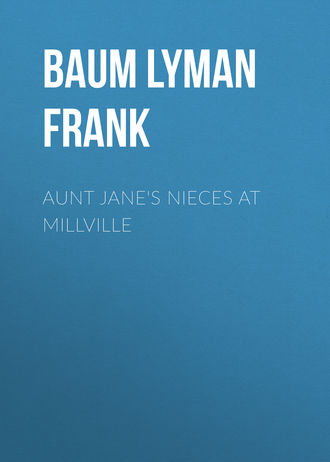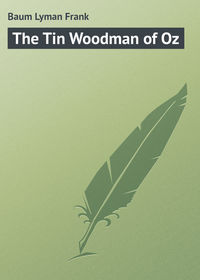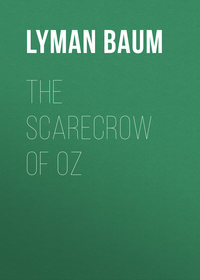 полная версия
полная версияAunt Jane's Nieces at Millville
CHAPTER XI.
THREE AMATEUR DETECTIVES
Puzzling her brain what to do next, Louise suddenly decided to confide her secret to her two cousins. Not that she considered them capable of a greater success than she could herself accomplish, but they might prove valuable assistants in the capacity of lieutenants. She had great respect for Beth's calm judgment and keen intuitions, and Patsy had a way of accomplishing difficult things with ease.
The two girls listened to Louise with expressions of mingled wonder and amusement while she confided to them her first suspicions that Captain Wegg had been murdered, and then the bits of information she had gathered to strengthen the surmise and assure her she was justified in her efforts to untangle the web of mystery.
"You see, my dears," she explained, impressively, as the three lounged upon the grass in the shade of the right wing of the house, "there is a very interesting story about these people that ought to guide us directly to a solution of the puzzle. A roving sea captain marries a girl of good family in spite of the opposition of her relatives. His boatswain, a confidential servant, marries the girl's maid. The next thing we know is that a 'great trouble' causes them to flee – doubtless some crime committed by the captain. It may have been robbery, or perhaps piracy on the high seas; who knows? Anyhow, he steals away to this forsaken spot, far from the sea or the railroads, and builds a fine house on a worthless farm, showing that he has money, but that retirement is his main object. Here the Weggs make no friends: but the wife cries her eyes out until she dies miserably, leaving a son to the tender mercies of a wicked father. So fearful is he of discovery that he will not allow the boy to go to school, but tries to educate him himself."
"Probably the captain's real name was not Wegg, at all," suggested
Patsy, entering into the spirit of the relation.
"Probably not, dear. He would assume some name, of course, so that it might be more difficult to trace him," answered Louise. "But now – mark me well, girls! – a Nemesis was on the track of this wicked sinner. After many years the man Captain Wegg had wronged, or stolen from, or something, discovered his enemy's hiding place. He promptly killed the Captain, and probably recovered the money, for it's gone. Old Thompson, Ethel's grandfather, happened to be present. The murderer also took his money, and – "
"Oh, Louise! That isn't reasonable," objected Beth, who had been following the story carefully.
"Why not?"
"Because you are making the wronged party as wicked as the man who wronged him. When the avenger found his enemy he might force him to give up his ill-gotten gains; I agree with you there; but he wouldn't be liable to rob old Thompson, I'm sure."
"Beth is right," said Patsy, stoutly.
"But old Thompson lost his money at the same time, you know; at least his money could never be found afterward. And I'm sure he was dealt some blow on the head that made him crazy," answered Louise, positively.
They thought that over.
"I believe I can explain it, girls," said Beth, presently. "The avenger found Captain Wegg, all right – just as Louise has said – and when he found him he demanded a restitution of his money, threatening to send the criminal to jail. That would be very natural, wouldn't it? Well, Captain Wegg had spent a good deal of the money, and couldn't pay it all back; so Ethel's grandfather, being his friend, offered to makeup the balance himself rather than see his friend go to prison. That accounts for the disappearance of all the money."
"If that is so," observed Patsy, "I don't see why the man, having got his money back, should murder one and knock the other on the head."
It way a puzzle, they all acknowledged, and after discussing the matter from every conceivable standpoint they were no nearer an explanation. That's the way with mysteries; they're often hard to understand.
"The only thing that occurs to me as being sensible," said Louise, finally, "is that after the money was paid over they got into a quarrel. Then the avenger lost his temper and committed the murders."
"This talk about an avenger is all guess work," asserted Beth, calmly.
"I don't believe the facts point to an avenger at all."
"But the old crime – the great trouble – "
"Oh, we'll allow all that," returned Beth; "and I don't say that an avenger wouldn't be the nicest person to exact retribution from the wicked captain. But avengers don't always turn up, in real life, when they ought to, girls; so we mustn't be too sure that one turned up in this case."
"But now else can you account for the captain's murder?" objected
Louise.
"Well, some one else might know he had money, and that Ethel's grandfather had money, too," was the reply. "Suppose the robbery and murder had nothing to do with the old crime at all, but that the murderer knew this to be a deserted place where he could make a good haul without being discovered. The two old men sat in the right wing, quite unsuspicious, when – "
"When in walks Mr. Murderer, chokes the captain, knocks his friend on the brain-box, and makes off with the money!" continued Patsy, gleefully. "Oh, girls, I'm sure we've got it right this time."
Louise reflected a moment.
"This country is almost a wilderness," she mused, aloud, "and few strangers ever come here. Besides, a stranger would not know positively that these two men had money. If we abandon the idea of an avenger, and follow Beth's clue, then the murderer is still right here in Millville, and unsuspected by any of his neighbors."
"Oh, Louise!" with startled glances over their shoulders.
"Let us be sensible, reasoning girls; not silly things trying to figure out possible romances," continued Louise, with a pretty and impressive assumption of dignity. "Do you know, I feel that some angel of retribution has guided us to this lonely farmhouse and put the idea into my head to discover and expose a dreadful crime."
"Succotash!" cried Patsy, irrelevantly. "You're romancing this minute, Louise. The way you figure things out I wouldn't be surprised if you accused me, or Uncle John, any time during the next half hour. Adopting your last supposition, for the sake of argument, I'm interested to know what inhabitant of sleepy old Millville you suspect."
"Don't get flighty, Patricia," admonished Beth. "This is a serious matter, and Louise is in earnest. If we're going to help her we mustn't talk rubbish. Now, it isn't a bad suggestion that we ought to look nearer home for the key to this mystery. There's old Hucks."
"Hucks!"
"To be sure. No one knew so well as he the money affairs of the two men who were robbed."
"I'm ashamed of you," said Patsy.
"And the man's smile is a mask!" exclaimed Louise.
"Oh, no!" protested Patsy.
"My dear, no person who ever lived could smile every minute, winter and summer, rain or shine, day and night, and always have a reason for the smile."
"Of course not," agreed Beth. "Old Hucks is a curious character. I realized that when I had known him five minutes."
"But he's poor," urged Patsy, in defense of the old man. "He hasn't a penny in the world, and McNutt told me if we turned Thomas and Nora away they'd have to go to the poorhouse."
"That is no argument at all," said Louise, calmly. "If we consider the fact that Old Hucks may be a miser, and have a craving for money without any desire to spend it, then we are pretty close to a reason why he should bide his time and then murder his old master to obtain the riches he coveted. Mind you, I don't say Hucks is guilty, but it is our duty to consider this phase of the question."
"And then," added Beth, "if Hucks should prove to be a miser, it is easy to guess he would hide his wealth where he could secretly gloat over it, and still continue to pose as a pauper."
"I don't believe it," said Patsy, stoutly.
"You'll never make a successful detective if you allow your personal feelings to influence you," returned Louise. "I, too, sincerely hope that Thomas is innocent; but we are not justified in acquitting him until we have made a careful investigation and watched his actions."
"I'm quite sure he's connected with the mystery in some way," said Beth.
"It will do no harm to watch Old Hucks, as Louise suggests."
"And you might try to pump him, Patsy, and see if you can get him to talk of the murder. Some careless remark might give us just the clue we need and guide us to the real criminal. That would free Thomas from all suspicion, you see."
"But why do you ask me to do this?" demanded Patsy. "Thomas and I are good friends, and I'd feel like a traitor to try to get him to confess a murder."
"If he is innocent, you have done no harm," said her eldest cousin; "and if he is guilty you don't want him for your friend."
"He likes you, dear," added Beth, "and perhaps he will tell you frankly all we want to know. There's another person, though, Louise, who might tell us something."
"Who is that?"
"The little man with the golf-ball eyes; McNutt."
"Now, there's some sense in suspecting him," exclaimed Patsy. "We know he's a robber, already, and a man who is clever enough to sell Uncle John three 'Lives of the Saints' would stick at nothing, I'm sure."
"He hasn't enough courage to commit a great crime," observed Beth.
"But he may be able to give us some information," Louise asserted; "so I propose we walk over to the town tomorrow morning and interview him."
This was promptly agreed to, for even Patsy, the least enthusiastic detective of the three, was eager to find some sort of a solution of the Wegg mystery. Meantime they decided to watch Old Hucks very carefully.
Beth happened to be present when Uncle John paid Thomas his weekly wage that evening, and was interested to notice how the old man's hand trembled with eagerness as he took the money.
"How much are you accustomed to receive?" Uncle John had asked.
"Nothing 'tall, sir, since Cap'n Wegg died," was the reply. "We was glad enough to have a home, Nora an' me, 'thout 'spectin' wages."
"And there was no one here for you to serve," mused Uncle John. "But in
Captain Wegg's day, how much did he give you?"
Thomas hesitated, and his smile wavered an instant.
"My old master was also my old friend," said he, in a low voice; "an' I ast him fer little money because my needs were little."
"Well, the conditions are now different," remarked Uncle John, carelessly; "and while you are in my employ you shall have your wages regularly. Will ten dollars a week be satisfactory?"
"Oh, sir!"
"And five for Nora."
"You are too good, sir. I – I – "
"Never mind, Thomas. If you want more at any time let me know."
It was then, as the old man took the fifteen dollars extended to him, that Beth noted a flash in the mild blue eyes and a trembling of the horny hands. Hucks was very glad to get the money; there was little doubt of that.
She spoke of this incident to Louise, and the following morning they tested the man again. All three girls being present, Beth tendered Old Hucks two dollars, saying it was intended as a slight mark of her appreciation of his attention. Thomas demurred at first, but on being urged took the money with the same eager gesture he had before displayed. Louise followed with a donation of a like sum, and Patsy gave the old man still another two dollar bill. This generosity so amazed him that tears stood in his eyes as he tried to thank them all. It was noticed that the smile did not give way even to the tears, although it was tinged with a pathetic expression that proved wonderfully affecting. He concealed the offerings with a stealthy motion, as if ashamed of his weakness in accepting them, and then hurried away to his work.
"Well," said Louise, when they were alone, "is Thomas a miser or not?"
"He clutched the money almost as if he loved it," observed Beth, in a musing and slightly regretful tone.
"But think how poor he has been," pleaded Patsy, "and how destitute both he and Nora are yet. Can we blame him for being glad to earn something substantial at last?"
Somehow that did not seem to explain fully the old man's behavior, and the girl who had championed him sighed and then gave a sudden shiver as she remembered the awful suspicion that had fallen upon this strange individual. If the proof must be accepted that Hucks had miserly instincts, had not Beth accidentally stumbled upon a solution of the whole mystery?
But Patsy would not believe it. If Thomas' open countenance lied, it was hard to put faith in any one.
CHAPTER XII.
THE BAITING OF PEGGY M'NUTT
By this time the three nieces were so thoroughly impressed with the importance of the task they had undertaken that more ordinary things failed to interest them. Louise longed to solve the mystery. Beth wanted to punish the wrongdoers. Patsy yearned to exonerate the friends whom she imagined unjustly accused. Therefore the triple alliance for detective purposes was a strong one.
By mutual agreement they kept the matter secret from Uncle John, for they realized what a triumph it would be to surprise the old gentleman with proofs of their cleverness. To confide in him now would mean to invite no end of ridicule or good natured raillery, for Uncle John had not a grain of imagination or romance in his nature and would be unable to comprehend the delights of this secret investigation.
Because he was in the dark the significant looks and unnatural gravity of his nieces in the succeeding days puzzled the poor man greatly.
"What's wrong, girls?" he would ask. "Aren't you happy here? Do you miss anything you'd like? Is it too quiet and dull at Millville to suit you?"
"Oh, no!" they would exclaim. "We are having a splendid time, and would not leave the farm for anything."
And he often noticed them grouped in isolated places and conversing in low, eager tones that proved "something was up." He felt somewhat grieved that he was not their confidant, since these girls and their loyal affection for him constituted the chief joy of his life. When he put on his regulation fishing costume and carried his expensive rod and reel, his landing net and creel to the brook for a day's sport, he could no longer induce one of his girls to accompany him. Even Patsy pleaded laughingly that she had certain "fish to fry" that were not to be found in the brook.
Soon the three nieces made their proposed visit to McNutt, their idea being to pump that individual until he was dry of any information he might possess concerning the Wegg mystery. They tramped over to the village after breakfast one morning and found the agent seated on the porch before his little "office," by which name the front room of his cottage was dignified. He was dressed in faded overalls, a checked shirt and a broad-brimmed cheap straw hat. His "off foot," as he called it with grim humor, was painted green and his other foot was bare and might have been improved in color. Both these extremities rested on the rail of the porch, while McNutt smoked a corncob pipe and stared at his approaching visitors with his disconcerting, protruding eyes.
"Good morning, Mr. McNutt," said Louise, pleasantly. "We've come to see if you have any books to sell."
The agent drew a long breath. He had at first believed they had come to reproach him for his cruel deception; for although his conscience was wholly dormant, he had at times been a bit uneasy concerning his remarkable book trade.
"Uncle is making a collection of the 'Lives of the Saints.'" announced Patsy, demurely. "At present he has but three varieties of this work, one with several pages missing, another printed partly upside down, and a third with a broken corner. He is anxious to secure some further variations of the 'dee looks' Lives, if you can supply them."
Peggy's eyes couldn't stare any harder, so they just stared.
"I – I hain't got no more on hand," he stammered, fairly nonplussed by the remarkable statement.
"No more? Oh, how sad. How disappointed we are," said Beth.
"We were depending so much on you. Mr. McNutt," added Louise, in a tone of gentle reproach.
McNutt wiggled the toes of his good foot and regarded them reflectively. These city folks were surely the "easiest marks" he had ever come across.
"Ef ye could wait a few days," he began, hopefully, "I might – "
"Oh, no; we can't possibly wait a single minute," declared Patsy. "Unless Uncle can get the Saints right away he will lose interest in the collection, and then he won't care for them at all."
McNutt sighed dismally. Here was a chance to make good money by fleecing the lambs, yet he was absolutely unable to take advantage of it.
"Ye – ye couldn't use any duck eggs, could ye?" he said, a sudden thought seeming to furnish him with a brilliant idea.
"Duck eggs?"
"I got the dum-twistedest, extry fine lot o' duck eggs ye ever seen."
"But what can we do with duck eggs?" inquired Beth, wonderingly, while
Patsy and Louise tried hard not to shriek with laughter.
"W'y, set 'em under a hen, an' hatch 'em out."
"Sir," said Beth, "I strongly disapprove of such deceptions. It seems to me that making a poor hen hatch out ducks, under the delusion that they are chickens, is one of the most cruel and treacherous acts that humanity can be guilty of. Imagine the poor thing's feelings when her children take to water! I'm surprised you could suggest such a wicked use for duck eggs."
McNutt wiggled his toes again, desperately.
"Can't use any sas'frass roots, can ye?"
"No, indeed; all we crave is the 'Lives of the Saints.'"
"Don't want to buy no land?"
"What have you got to sell?"
"Nuth'n, jest now. But ef ye'll buy I kin git 'most anything."
"Don't go to any trouble on our account, sir; we are quite content with our splendid farm."
"Shoo! Thet ain't no good."
"Captain Wegg thought it was," answered Louise, quickly seizing this opening. "Otherwise he would not have built so good a house upon it."
"The Cap'n were plumb crazy," declared the agent, emphatically. "He didn't want ter farm when he come here; he jest wanted to hide."
The girls exchanged quick glances of intelligence.
"Why?"
"Why?" repeated McNutt. "Thet's a thing what's puzzled us fer years, miss. Some thinks Wegg were a piret; some thinks he kidnaped thet pretty wife o' his'n an' took her money; some thinks he tried to rob ol' Will Thompson, an' Will killed him an' then went crazy hisself. There's all sorts o' thinks goin' 'round; but who knows?"
"Don't you, Mr. McNutt?"
The agent was flattered by the question. As he had said, the Weggs had formed the chief topic of conversation in Millville for years, and no one had a more vivid interest in their history than Marshall McMahon McNutt. He enjoyed gossiping about the Weggs almost as much as he did selling books.
"I never thought I had no call to stick my nose inter other folkses privit doin's," he said, after a few puffs at the corncob pipe. "But they kain't hide much from Marsh McNutt, when he has his eyes open."
Patsy wondered if he could possibly close them. The eyelids seemed to be shy and retiring.
"I seen what I seen," continued the little man, glancing impressively at his attentive audience. "I seen Cap'n Wegg livin' without workin', fer he never lifted a hand to do even a chore. I seen him jest settin' 'round an' smokin' his pipe an' a glowerin' like a devil on ev'ryone thet come near. Say, once he ordered me off'n his premises – me!"
"What a dreadful man," said Patsy. "Did he buy any 'Lives of the
Saints?'"
"Not a Life. He made poor Ol' Hucks fetch an' carry fer him ev'ry blessid minnit, an' never paid him no wages."
"Are you sure?" asked Louise.
"Sure as shootin'. Hucks hain't never been seen to spend a cent in all the years he's been here."
"Hasn't he sold berries and fruit since the Captain's death?"
"Jest 'nough to pay the taxes, which ain't much. Ye see, young Joe were away an' couldn't raise the tax money, so Ol' Hucks had to. But how they got enough ter live on, him an' Nora, beats me."
"Perhaps Captain Wegg left some money," suggested Patsy.
"No; when Joe an' Hucks ransacked the house arter the Cap'n's death they couldn't find a dollar. Cur'ous. Plenty o' money till he died, 'n' then not a red cent. Curiouser yet. Ol' Will Thompson's savin's dis'peared, too, an' never could be located to this day."
"Were they robbed, do you suppose?" asked Louise.
"Nat'rally. But who done it? Not Ol' Hucks, fer he's too honest, an' hasn't showed the color of a nickel sense. Not Joe; 'cause he had to borrer five dollars of Bob West to git to the city with. Who then?"
"Perhaps," said Louise, slowly, "some burglar did it."
"Ain't no burglers 'round these parts."
"I suppose not. Only book agents," remarked Beth.
McNutt flushed.
"Do ye mean as I did it?" he demanded, angrily. "Do ye mean as I killed
Cap'n Wegg an' druv 01' Will crazy, an' robbed the house?"
His features were fairly contorted, and his colorless eyes rolled fearfully.
"If you did," said Beth, coolly, "you would be sure to deny it."
"I kin prove a alybi," answered the little man, calming down somewhat. "I kin prove my ol' woman had me locked up in the chicken-coop thet night 'cause I wouldn't split a lot o' cordwood thet were full o' knots." He cast a half fearful glance over his shoulder toward the interior of the cottage. "Next day I split 'em," he added, mildly.
"Perhaps," said Louise, again, "someone who knew Captain Wegg in the days before he came here followed him to his retreat and robbed and murdered him."
"Now ye've hit the nail on the head!" cried the agent, slapping his fat thigh energetically. "Thet's what I allus claimed, even when Bob West jest shook his head an' smiled sort o' superior like."
"Who is Bob West?" asked Louise, with interest.
"He's our implement man, an' hardware dealer. Bob were the on'y one o' the Millville folks thet could git along with Cap'n Wegg, an' even he didn't manage to be any special friend. Bob's rich, ye know. Rich as blazes. Folks do say he's wuth ten thousan' dollars; but it don't set Bob up any. He jest minds his business an' goes on sellin' plows an' harvesters to the farmers an' takin' notes fer 'em."
"And you say he knew Captain Wegg well?" inquired Patsy.
"Better 'n' most folks 'round here did. Once er twicet a year the Cap'n 'd go to Bob's office an' set around an' smoke his pipe. Sometimes Bob would go to the farm an' spend an' ev'nin'; but not often. Ol' Will Thompson might be said to be the on'y friend the Cap'n really hankered fer."
"I'd like to meet Mr. West," said Louise, casting a shrewd look at her cousins. For here was another clue unearthed.
"He's in his store now." remarked McNutt, "Last buildin' on the left. Ye can't miss it."
"Thank you. Good morning, sir."
"Can't use any buttermilk er Dutch cheese?"
"No, thank you."
McNutt stared after them disconsolately. These girls represented so much money that ought to be in his pockets, and they were, moreover, "innercent as turtle doves"; but he could think of no way to pluck their golden quills or even to arrest their flight.
"Well, let 'em go," he muttered. "This thing ain't ended yit."
CHAPTER XIII.
BOB WEST, HARDWARE DEALER
A few steps down the little street brought the girls to the hardware store, quite the most imposing building in town. They crossed the broad platform on which stood samples of heavy farm machinery and entered a well-stocked room where many articles of hardware and house furnishings were neatly and systematically arranged.
The place seemed deserted, for at that time of day no country people were at Millville; but on passing down the aisle the visitor approached a little office built at the rear of the store. Behind the desk Bob West sat upon his high stool, gravely regarding his unusual customers over the rims of his spectacles.
"Good morning," said Louise, taking the lead. "Have you a stew pan?"
The merchant left the office and silently walked behind the counter.
"Large or small, miss?" he then asked.
The girls became interested in stew pans, which they were scarcely able to recognize by their official name. Mr. West offered no comment as they made their selection.









